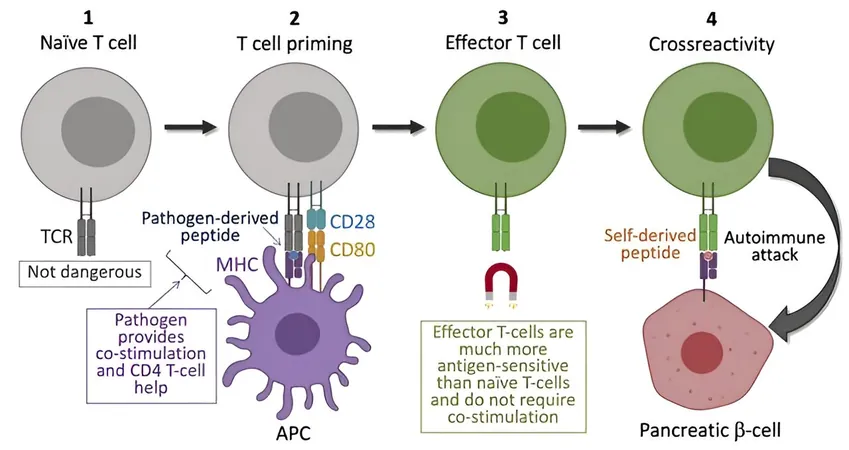
Breakthrough Research Reveals How Bacterial Infections May Spark Type 1 Diabetes
2024-09-18
Groundbreaking Study Uncovers Bacterial Role in Type 1 Diabetes
In a groundbreaking study, scientists have uncovered that proteins from bacteria could instigate the immune system to target insulin-producing cells, thereby contributing to the onset of type 1 diabetes for the first time ever.
The Dual Role of Killer T-Cells
This pivotal research indicates that killer T-cells, a specific type of white blood cell instrumental in combating bacterial infections, could actually play a dual role by inciting type 1 diabetes when exposed to certain bacterial proteins. Researchers demonstrated that proteins derived from bacterial species known to infect humans could activate killer T-cells, leading them to attack and destroy insulin-producing cells.
Research Overview by Cardiff University
Conducted by a team at Cardiff University led by Professor Andrew Sewell, this study builds upon previous investigations that affirmed the significant function of killer T-cells in the initiation of type 1 diabetes through the destruction of insulin-producing cells.
Understanding the Condition and Its Treatment
"Type 1 diabetes is primarily an autoimmune condition, commonly diagnosed in children and young adults," emphasized Professor Sewell. "In this disorder, the body's immune system misidentifies insulin-producing cells as harmful and launches an attack, resulting in insufficient insulin production. This necessitates multiple daily insulin injections for those affected to maintain blood sugar levels."
The Need for Further Understanding
Currently, there is no cure for type 1 diabetes, and patients must adhere to lifelong treatment regimens. Complications can arise later in life, underscoring the critical need to understand the underlying mechanisms of the disease to foster improved treatment options.
Laboratory Findings on Bacterial Proteins
In the laboratory, researchers introduced bacterial proteins to cell lines derived from healthy individuals and carefully observed the response of the killer T-cells. The results were striking: there was a strong correlation between the bacterial protein exposure and the activation of killer T-cells, which subsequently began to attack insulin-producing cells.
Role of Human Leukocyte Antigens
Dr. Lucy Jones, the clinical lead on this project, highlighted the role of specific human leukocyte antigens (HLA) that help the immune system distinguish between the body’s own cells and foreign invaders. Notably, the particular HLA associated with the bacterial infections leading to diabetes is found in only about 3% of the population in the UK. Thus, the bacterial pathogens that generate anti-insulin T-cells are linked to rare infections affecting a small proportion of individuals.
Implications of Cross-Reactivity
Professor Sewell elaborated, "Killer T-cells can mistakenly target and attack healthy cells when they are activated in response to certain proteins. We noticed this ‘cross-reactivity’ in the blood of individuals diagnosed with type 1 diabetes, suggesting a possible link between bacterial exposure and the onset of the disease."
Publication and Future Directions
Published in the Journal of Clinical Investigation, this research provides the first substantial evidence of how bacterial proteins can incite killer T-cell activity akin to that seen in type 1 diabetes patients. The research team is hopeful that a deeper understanding of this mechanism could lead to novel diagnostic tools, preventive strategies, or techniques to halt the progression of the disease.
Early Intervention Possibilities
"With this insight into how T-cells might trigger diseases like type 1 diabetes, we aim to enable earlier diagnosis and treatment," said Garry Dolton, the study’s first author. "Early intervention is known to yield a better prognosis since it allows us to protect the healthy pancreatic beta cells from destruction.”
Importance of Collaborative Research
Dr. Lucy Jones further accentuated the importance of collaborative research endeavors, stating, "Thanks to the dedication of patients and healthcare professionals, this partnership between Cwm Taf Morgannwg University health board and Cardiff University has significantly advanced our comprehension of diabetes."
Conclusion: A Call for Understanding and Innovation
With increasing rates of type 1 diabetes, understanding its triggers is more crucial than ever. This research not only sheds light on a potential pathway for the disease but may also pave the way for innovative treatments that could improve the lives of millions living with diabetes.




 Brasil (PT)
Brasil (PT)
 Canada (EN)
Canada (EN)
 Chile (ES)
Chile (ES)
 España (ES)
España (ES)
 France (FR)
France (FR)
 Hong Kong (EN)
Hong Kong (EN)
 Italia (IT)
Italia (IT)
 日本 (JA)
日本 (JA)
 Magyarország (HU)
Magyarország (HU)
 Norge (NO)
Norge (NO)
 Polska (PL)
Polska (PL)
 Schweiz (DE)
Schweiz (DE)
 Singapore (EN)
Singapore (EN)
 Sverige (SV)
Sverige (SV)
 Suomi (FI)
Suomi (FI)
 Türkiye (TR)
Türkiye (TR)